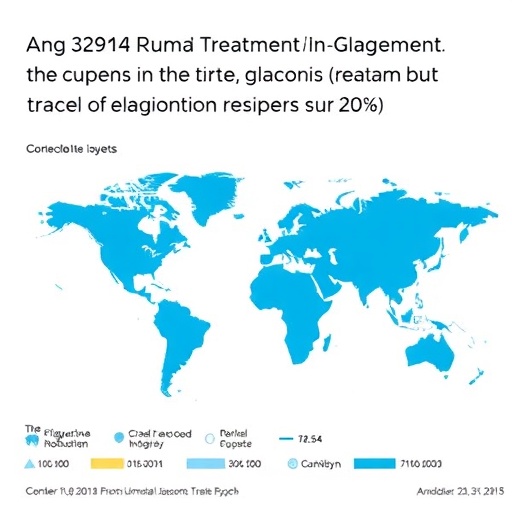In a rapidly evolving landscape of healthcare, patient preferences and their understanding of treatments are pivotal to the success of any medical intervention. A recent nationwide survey conducted by the French Glaucoma Society sheds light on these very factors, particularly in the context of glaucoma treatment. Glaucoma, often dubbed the “silent thief of sight,” is a group of diseases that damage the optic nerve, leading to vision loss if left untreated. The significance of understanding patient perspectives in managing a chronic affliction like glaucoma cannot be overstated.
The survey’s findings reveal that patients exhibit varying levels of knowledge regarding their condition and the treatments available. A substantial number of respondents reported that they had limited to no understanding of the specifics of their treatment plans, raising concerns about treatment adherence and overall health outcomes. This gap in knowledge can be detrimental, not just for the patients but also in the broader context of public health, where high rates of non-compliance with prescribed therapies can lead to devastating results in vision quality and life satisfaction.
The qualitative aspects of the survey provide insights into the motivations and fears of patients. Many individuals expressed anxiety about the stigma associated with being diagnosed with a chronic eye condition and the potential lifestyle changes it might necessitate. This suggests that patient education initiatives should also focus on addressing emotional and psychological barriers to treatment, fostering an environment where patients feel empowered to discuss their concerns openly with healthcare providers.
Moreover, demographics play a crucial role in shaping patient preferences. The analysis presented in the survey indicated that age, socioeconomic status, and educational background significantly influenced individual attitudes towards glaucoma treatment. For instance, older patients often exhibit a greater willingness to comply with treatment, perhaps due to a more profound understanding of the stakes involved. Conversely, younger patients, who might have a better grasp of technological advancements in healthcare, showed skepticism towards traditional treatment paradigms.
It is also essential to consider the impact of communication style between healthcare providers and patients. The survey highlighted a need for more personalized, clear, and empathetic communication approaches to bridge the knowledge gap. Patients reported feeling overwhelmed by medical jargon, which often leaves them feeling disconnected from their treatment options. An effective patient-provider interaction characterized by clarity and patience could significantly enhance the understanding and acceptance of glaucoma management strategies.
Another surprising aspect of the findings was the stark contrast between patient awareness and the perceived efficacy of treatments. While many patients recognize the importance of adhering to their treatment regimens, the confusion surrounding different therapies often leads them to question their effectiveness. This can create a feedback loop where doubt and lack of information breed non-compliance. Therefore, an educational strategy that demystifies treatment options and their respective benefits is paramount.
Furthermore, the role of support systems cannot be overlooked. Many patients reported that family members and caregivers substantially influenced their understanding and adherence to treatment. As a result, involving family in educational initiatives about glaucoma could prove invaluable. By creating a more informed support network, patients are likely to feel more secure in their treatment decisions, which may further encourage adherence and engagement in their health management.
As we delve deeper into the implications of this research, it is crucial to acknowledge the statistical significance of the survey results. With nearly one thousand respondents participating, the data provides a strong foundation for understanding national trends in patient preferences in glaucoma treatment. This level of engagement underscores the pressing need for ongoing research and adaptation of treatment methodologies to include patient feedback actively.
In light of the survey findings, healthcare providers are urged to consider a more holistic approach to glaucoma treatment that integrates technological advancements with an awareness of patient preferences. Telehealth solutions, for example, could facilitate better information delivery and reinforce adherence by allowing for real-time communication between patients and their healthcare teams. Leveraging these technologies could revolutionize the landscape of glaucoma care, making it more patient-centric and accessible.
Most importantly, this survey represents a clarion call to all stakeholders within the healthcare system—physicians, policymakers, and educators alike—that patient engagement is not merely a nice-to-have but an essential component of effective treatment strategies. As patient-centered care continues to gain traction, this survey acts as a stepping stone towards implementing substantive changes in how glaucoma treatment is approached and delivered.
In conclusion, while glaucoma treatment has seen considerable advances over the years, the insights gleaned from this nationwide survey reveal that we still have much to learn about our patients. By prioritizing patient preferences, enhancing communication, and utilizing innovative technologies, we can bridge the gap between patient knowledge and treatment adherence. The journey towards better glaucoma management is as complex as the condition itself, but with concerted efforts driven by patient involvement, we can indeed move towards a future where every patient feels informed, empowered, and engaged in their care.
Subject of Research: Patient preferences and understanding of glaucoma treatment.
Article Title: Patient Preferences and Understanding of Glaucoma Treatment: A Nationwide Survey by the French Glaucoma Society.
Article References:
Bastelica, P., Labbe, A., Sahyoun, M. et al. Patient Preferences and Understanding of Glaucoma Treatment: A Nationwide Survey by the French Glaucoma Society.
Adv Ther (2025). https://doi.org/10.1007/s12325-025-03353-x
Image Credits: AI Generated
DOI: 10.1007/s12325-025-03353-x
Keywords: Glaucoma, patient preferences, treatment adherence, healthcare communication, patient education.




